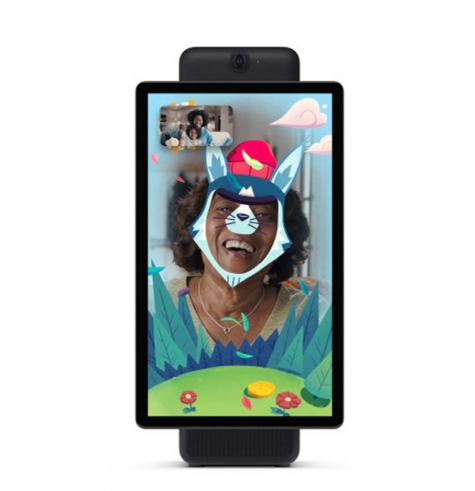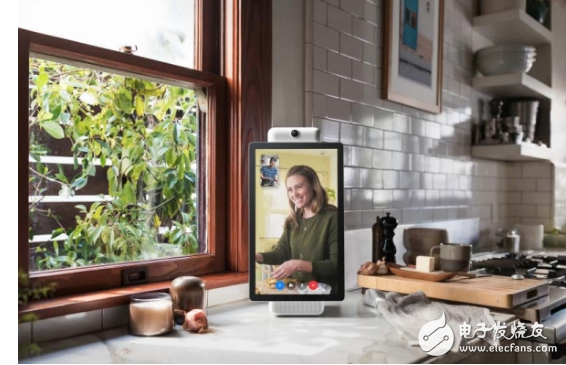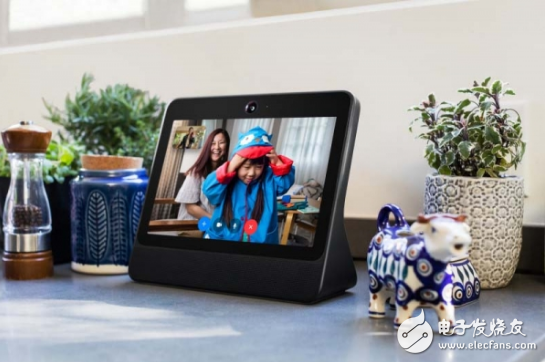On October 8, Facebook released its first consumer electronic products-Portal and Portal+. This is a smart speaker launched by Facebook, which can display photos and videos posted by friends on Facebook, and conduct video calls based on enhanced artificial intelligence through Messenger. In addition, the device can also talk to Amazon's Alexa and play music content from Spotify, Pandora and iHeartRadio. Different from traditional smart speakers, Portal and Portal+ have an extra screen and a wide-angle camera to watch videos and make video calls.
Among them, the 10-inch Portal is priced at US$199, and the 15.6-inch version of Portal+ is priced at US$349. The device is expected to be officially launched in early November this year, and is now open for reservations on Amazon, Best Buy and Facebook.
Both Portal devices provide a series of artificial intelligence-driven services. Among them, the Smart Camera used for video calls can track specific objects (the feature does not include facial recognition software); Smart Sound can adjust the volume of call participants to ensure The volume of the dialogue is always appropriate. In addition, Spotlight mode can use the camera to track a specific participant in a video call. (Smart Camera and Smart Sould will be deployed locally on the device)
Portal's wide-angle lens is a major selling point. It uses artificial intelligence technology that can recognize the shape of the body, so as to achieve auto focus, and always keep the user in the picture without adjusting the angle of the device.
According to Rafa Camargo, the head of the Portal team and the vice president of Facebook, the development of Portal devices began two years ago, aiming to establish a new software experience and a new artificial intelligence technology system, so that people can do without a computer or smartphone. Make video calls naturally and easily. Based on this, Facebook also organized a dedicated team internally.
It is understood that the Portal team now belongs to Facebook’s AR/VR business unit and is built by Building 8. This team is a consumer-level hardware development team within Facebook. It involves projects ranging from augmented reality to drones to "skin touch text". "Input" and "conscious typing" can be described as all-encompassing. But at present, the size of the Portal team has not been revealed.
In an interview, Camargo stated that the Portal team will continue to develop smart home hardware, and that the products launched in the future will be far from limited to two Portal devices.
Facebook's entry into the smart speaker market seems a bit slow, but it still caught up with this wave. In terms of performance, Portal is relatively close to the second-generation Amazon Echo Show, which was just launched last month and is equipped with a 10-inch screen and capable of video calls. In addition, the Smart Displays with Google Assistant developed by Portal, JBL and Lenovo are also relatively similar.
It is worth mentioning that as of September 2017, the monthly active users of Messenger have reached 1.3 billion. This means that through Messenger, Portal will build the world's largest chat application user group.

At the same time, in order to enrich the content of video calls, Facebook will also provide Portal with supporting App Sotre, and release a software development kit for partners and third-party developers to provide Portal video calls with augmented reality experiences for children and adults. One of the first AR functions in the video call is Story TIme, and the current experience content is "Three Little Pigs", "Five Little Monkeys" and "Trouble Bubbles". In addition, Facebook will also launch a set of Portal application SDK, allowing developers to use the Spark AR platform (previously named Camera Effects) to share the inbound AR experience.
In the initial version, the applications that users can use include Food Network, Newsy, and music streaming services previously reported. In addition, Facebook Watch will also have its own independent application. The most notable one is IGTV. According to the company's public reply email, this Instagram video service launched earlier this year will not be included in the first application camp.
What does the cooperation between Alexa and Facebook mean?
Cooperating with Amazon means that Portal will be able to connect Hulu and NBC. This is part of the cooperation agreement that Facebook and Amazon signed last month, when Amazon released a dozen new products, including Alexa.
But it should be noted that Portal cannot support Amazon Prime Video or the recently launched DVR of Fire TV Recast.
Incorporating Alexa into the Portal ecosystem means that users can use Portal to answer factual questions, control smart home devices, etc., and gain access to more than 50,000 Alexa Skills. In addition, this also means that Portal will combine Alexa language processing (APL) capabilities to deliver visual hands-free content. APL will manage the Portal video experience when the user talks with Alexa. For example, when the user asks the Portal device "Alexa, what's the weather?", he will see the forecast information, shopping list, and calendar provided by APL on the Portal. Activities and other information.

According to reports, the voices that users hear when using Portal devices are synthetic female voices. Camargo said that Portal will not provide male voice options for the time being when it debuts next month. In addition, at the beginning of the launch, Facebook did not plan to let Portal dock with Siri, Cortana or Samsung's Bixby assistant. Conversational AI will be responsible for providing Portal with voice recognition and converting voice commands into voice-to-text functions needed for operation, but these commands will focus on hands-free video calls and launching Portal applications.
According to reports, Facebook Messenger is being further integrated with Smart Assistant M, and Smart Assistant M is now able to give suggestions based on the words used in the conversation. But the Android version code of the app indicates that in the future, the company may develop a new version that instructs the content of the message and performs functions such as reminder settings.
The collaboration capabilities of M and Portal are currently unclear, but Facebook has created a trial assistant service for the smart assistant M as early as 2015, and the beta test version ended in January of the same year. At that time, the company indicated to users that the results of this test will be used to build future projects. Camargo said that the multiple teams involved in the project did play a role in building the Portal.
About privacy
For smart hardware products, privacy and security issues are of great concern to users. However, Facebook’s “oversights†in this area in the past year have obviously weakened people’s confidence in it. Following the 87 million user information leaks in March this year, it has recently revealed that 50 million user information is at risk of being hacked. This situation is not optimistic about the launch of Portal. This is also one of the reasons why Portal was originally scheduled to launch in April this year, but has been postponed so far.
In this regard, in order to give users peace of mind, Facebook stated that Portal will encrypt the content of video calls and does not allow recording of calls. AI functions such as Smart Camera and Smart Sould will also be deployed locally in the device. In addition, Portal does not support functions such as live video, nor does it support taking photos or taking screenshots.
Camargo said: "We made a deliberate choice, that is, at least at the beginning of the product launch, we will not provide any recording function. This means that users can rest assured that nothing in your video call will be recorded."
However, after hearing the "Hey Portal" wake-up word spoken by the user, the Portal device will record the content of the communication with the user. These recordings are saved in the same way as Microsoft Cortana, Amazon Alexa and Google Assistant, and will be used to improve far-field voice recognition and content analysis capabilities to better understand users' voice queries and commands. But users can also use the Facebook application to delete recordings.
Portal also has a unique feature, even if people listen to SpoTIfy music together during a call. The two participants can also adjust the volume at will without affecting each other.
Similar to Echo and Home, Portal allows users to mute the microphone. In addition, the device is also equipped with a plastic cover that can be rotated on top of the wide-angle camera.
There are not many Facebook elements in Facebook’s devices
To be precise, for a device like Portal, its success depends to a large extent on the expectation of changes in user behavior. Although Facebook is already very familiar with its extremely large social network, Portal does not seem to introduce most of these elements into this new product.
Camargo pointed out: "The way we measure success is actually whether people can focus and participate. Since then, when we surveyed users, we have indeed found that "participation" is indeed a good indicator. However, "Do you feel that your connection with the other party has become closer?" and "Have we achieved this goal?" are still open questions. "
It should be noted that since the initial design focused on video calls, do not hold out too much hope for using Portal to browse the latest photos posted by friends on Instagram.

In addition, the Stories function will also be "absent." Currently, Facebook and Messenger Stories have a total of 300 million daily active users, and the company also announced that its WhatsApp Status daily active users have reached 450 million.
Similarly, users cannot read news on the website, check likes or comments through Portal, and cannot receive notifications about groups or activities in the Facebook Marketplace. What's more surprising is that even Facebook Messenger, Instagram, or WhatsApp message notifications cannot be displayed in Portal.
The Portal screen can display images and videos together. When close friends are online, the UI will flash to remind you. This is similar to the way that the current Messenger app lists online friends at the top of the iOS and Android apps, or sends regular notifications to inform your friends when they have been online.
In order to facilitate the transfer of call activity from Portal to mobile phone, when the user picks up the phone and opens the Messenger application, a button will appear on the screen, asking if they want to transfer the call to the mobile phone.
China leading manufacturers and suppliers of DC Support Capacitors,DC Capacitor, and we are specialize in Electrolytic capacitor,High Voltage Capacitor, etc.DCMJ DC Support Capacitors
DCMJ DC Support Capacitors,Capacitors High Voltage,Dc-link Filter Capacitor,Dc Film Capacitors
YANGZHOU POSITIONING TECH CO., LTD. , https://www.cnpositioning.com